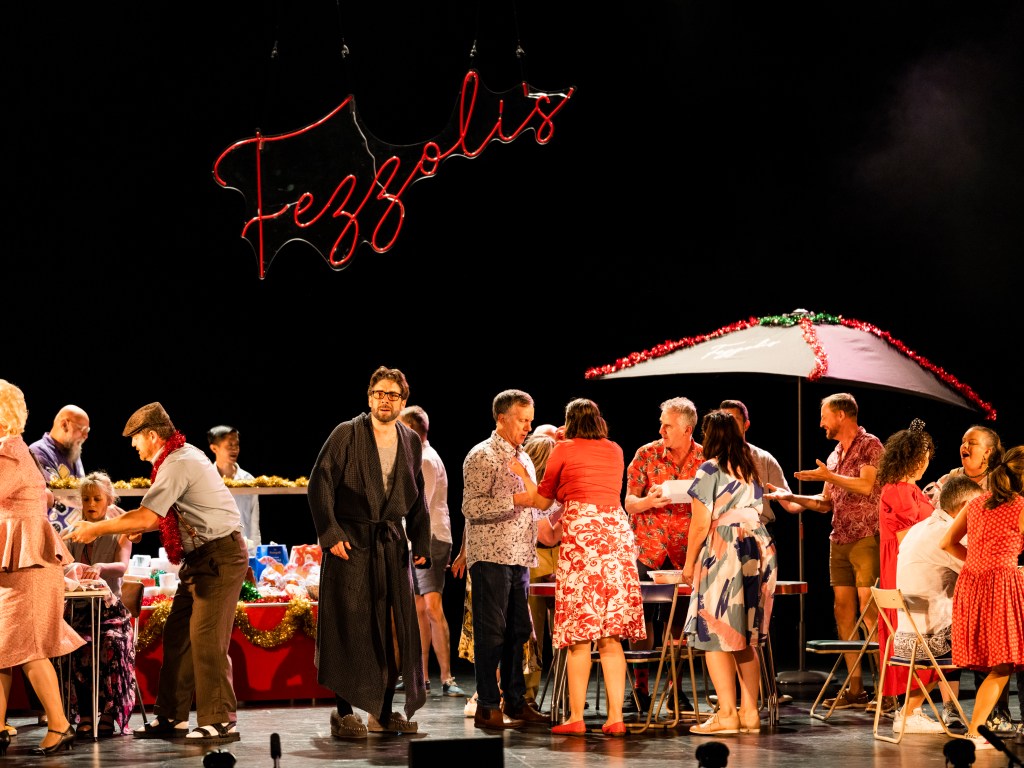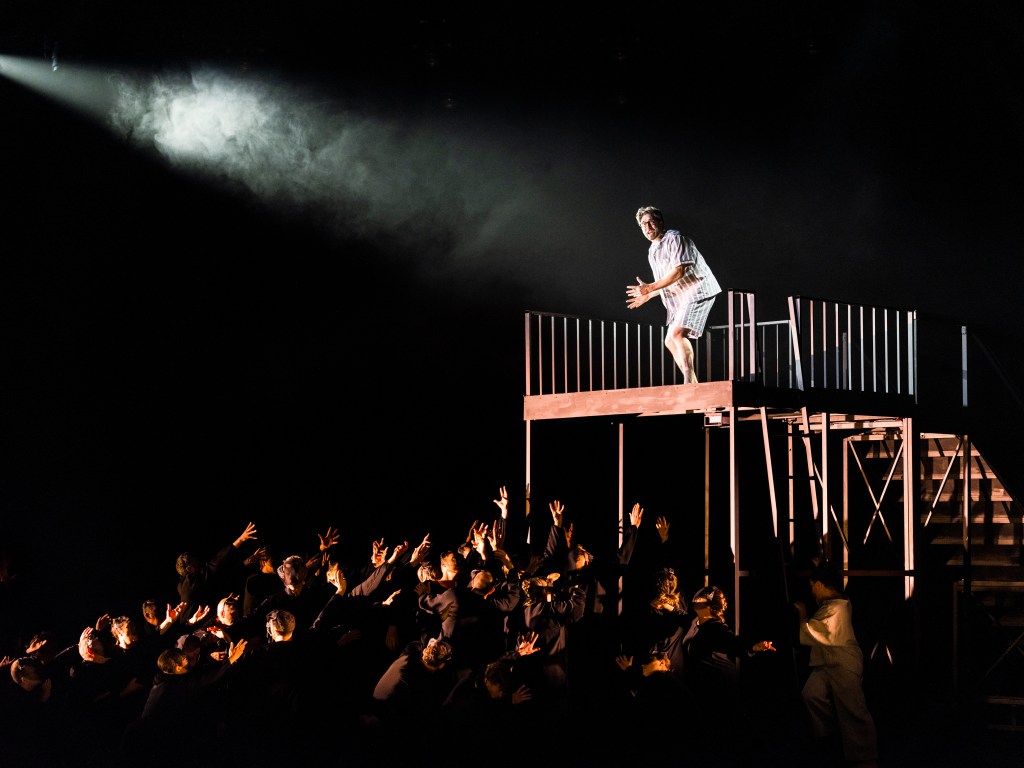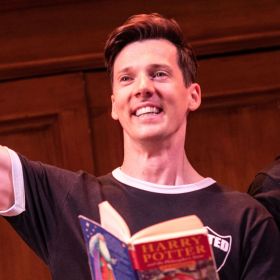In this newly commissioned work by Victorian Opera, A Christmas Carol was dragged out of a dark and gloomy Victorian London winter into the sunny brilliance of summertime Melbourne. Ebenezer Scrooge, performed and sung by baritone Samuel Dundas, became a snide and sniffling corporate overlord and his house a modernist, minimalist, monochrome two-storey, the sort where colour and life go to die.
Scrooge’s long-suffering but affable employee, Bob Cratchit (James Egglestone), was a cubicle office worker, his grey dividing walls adorned with tinsel. Scrooge’s nephew Fred here became his niece Freda, played with energetic and sassy humour by soprano Antoinette Halloran.
For this production, Victorian Opera brought together the powerhouse talents of composer Graeme Koehne and writer Anna Goldsworthy, under the deft direction of Emma Muir-Smith, to fashion an all-new version of Charles Dickens’ famous story, highlighting its relevance to contemporary Melbourne.
In Goldsworthy’s whip-smart libretto, Scrooge was anti-woke culture, thought Christmas was a socialist con and bah-humbugged at the local Big Issue seller and charity collectors as he barged around the colourful terrace-lined Melbourne streets, populated with brightly-hued and patterned Melburnians.
A rendition of Once in Royal David’s City – performed first as a solo by Tiny Tim (Maxwell Chao-Hong), before being taken up by the chorus – became an incredibly direct, powerful statement of modern injustices in this country: the plight of boat people, the cruel incarceration of asylum seekers in offshore prisons, the shameful treatment of First Nations people. As the children in the chorus stood on chairs, facing the audience, for the finale of the song, it was a stark and heart-breaking reminder that it’s the next generation who will be left to deal with the wounds we, and those before us, have inflicted on our world.

The section wasn’t 100% relevant to the progression of the story of Ebenezer and his personal existential crisis, but it didn’t matter. The themes of injustice and inequality, true to Dickens’ intent, hit home.
With Koehne’s all-new score, the music was simply wonderful – moving from a bright sleigh bell-led ‘Jingle Bells’ to the dark strings and percussion of Jacob Marley’s foreboding vision for Scrooge’s future – accessible and artful.
Drawing from well-known Christmas carols and songs, the score cleverly and amusingly brought in varied influences – the melody of an iPhone alarm was voiced by the oboe, playfully developed by different instruments and in different keys, as Scrooge awaited with trepidation the visit of the Ghost of Christmas Past.
The full orchestra with harp was conducted by Phoebe Briggs who, at the Palais in Melbourne’s St Kilda, was slightly raised above the audience in the stalls, allowing her expert ‘keeping-it-all-together’ to be visible – its own sort of visual poetry and a delight.
The Ghost of Christmas Past was physicalised as a ball of light, manipulated expertly by puppeteer Nadine Dimitrievitch, bringing life and humour to the character. Dimitrievitch also performed the unspeaking role of the Ghost of Christmas Future – seemingly gliding across the stage and emerging from a chorus of black-clad figures, all with their faces obscured. Lit from the side, Scrooge’s final ghostly Christmas visit was dark with dread – a dramatic contrast to the preceding one.
The belly-laughing Ghost of Christmas Present (portrayed by a yellow and red surf lifesaving gear-clad Simon Meadows) took Scrooge on a journey to experience Christmas at Bob Cratchit’s house. The ill-health of Tiny Tim awakened the humanity in Scrooge – and a good serving of hilarity was wrought from a scene involving a descending pudding. It was a lot of silliness and a lot of fun.
Sadly, the production had a short run. For a tale that has had continual reinvention in film, television, animated film, radio, opera and theatre, and has never been out of print since its publication as a novella in 1843, this version feels still vital today – made relevant for a new audience in modern day Melbourne, grappling with our own social problems at Christmastime in 2022.
Read: Book review: The Furphy Anthology 2022
With humour and grace, the production managed to straddle the challenging and narrow line between didacticism – often a killer of drama – and entertainment, often funny and a joy to watch.
A Christmas Carol by Charles Dickens
Produced by Victorian Opera
Palais Theatre, Melbourne
Composer: Graeme Koehne
Librettist: Anna Goldsworthy
Conductor: Phoebe Briggs
Director: Emma Muir-Smith
Set Designer and Associate Costume Designer: Claudia Mirabello
Costume Designer: Bridget Milesi
Lighting Designer: Richard Vabre
Sound Designer: Jim Atkins
Orchestra: Orchestra Victoria
Cast: Samuel Dundas, Simon Meadows, Antoinette Halloran, James Egglestone, Dominica Matthews, Akansha Hungenahally, Nadine Dimitrievitch, Maxwell Chao-Hong, Anderson Mokyiu, Shakira Dugan, Michael Dimovski, Stephen Marsh, Emily Burke
Community Chorus of adults: The Decibelles and Low Rez Choirs
Community Chorus of children: Sophie Cowall, Miliah Dee, Isla Goding, Jin Jin Li, Michelle Lung, Alec McMichael, Mathew Rigby, Michael Roskam, Alyssa Schiavello, Zara Tonon
A Christmas Carol was performed from December 14–17 2022.





